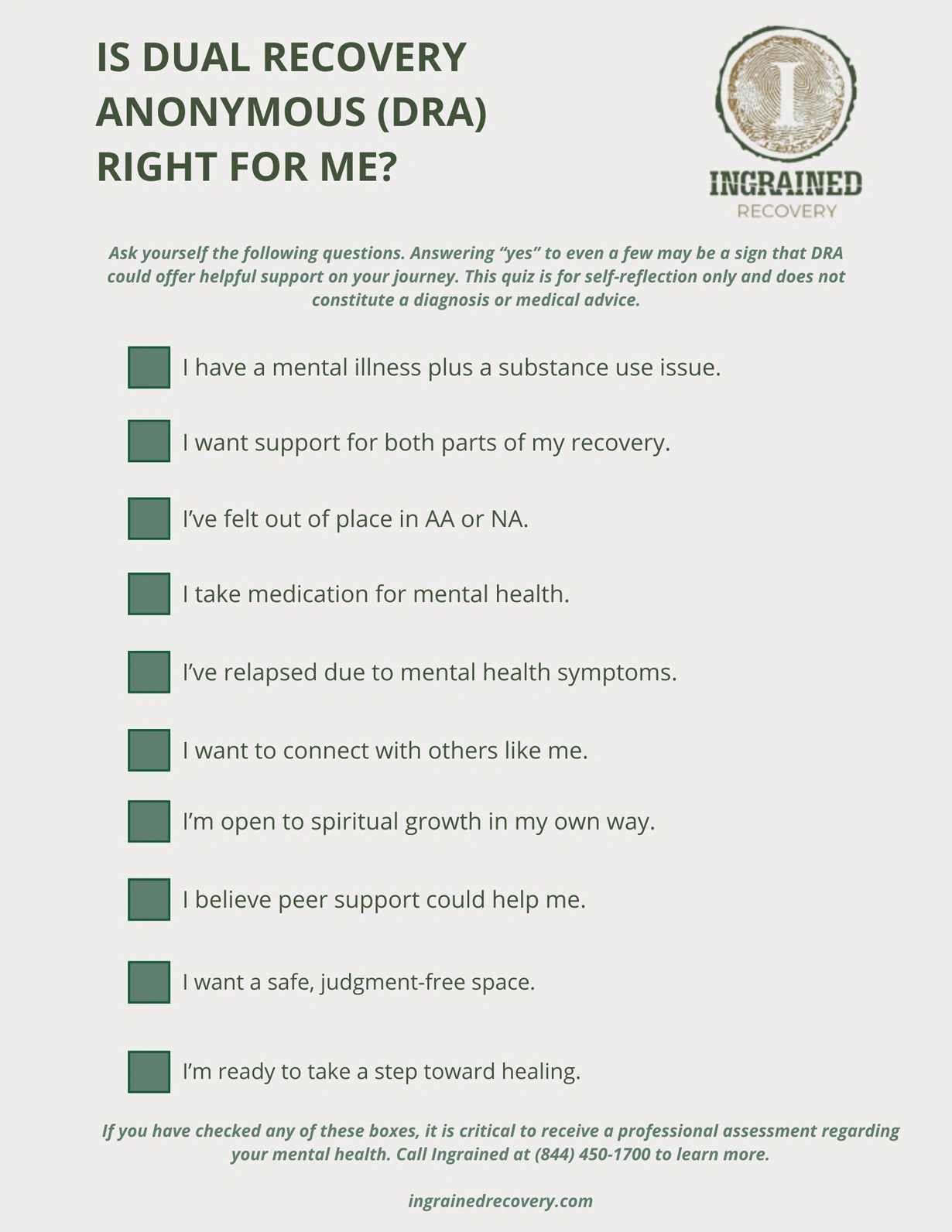12 Step Peer Support for Mental Health And Addiction Recovery
What is Dual Recovery Anonymous (DRA)? It’s an independent, nonprofessional mutual support program designed for people who live with a mental health condition or psychiatric illness and a substance use disorder.
DRA members form a supportive community where those who struggle with dual diagnosis recovery can come together. Following AA’s famous 12-Step model, the focus is on managing life’s challenges in a healthy and constructive way.
Ingrained Recovery, a luxury rehab ranch in Eastman, Georgia, recommends 12-Step program attendance as part of a well-rounded aftercare plan. The cravings for alcohol or drug use don’t magically disappear when one leaves their dual recovery treatment program; they’re on a lifelong journey.
Twelve Step self-help programs provide men and women with assistance with relapse prevention and other ongoing struggles and symptoms. Keep reading to learn more about this organization for people facing dual recovery challenges.
Get Accredited Treatment Programs at Ingrained Recovery

How Dual Recovery Anonymous Supports People with Dual Diagnosis
People with a dual diagnosis – a mental health disorder plus chemical dependency – face different recovery challenges than their peers with a single diagnosis. Traditional twelve-step self-help membership organizations may not address dual illness specifically. The gap can leave people with dual disorders feeling misunderstood and unsupported.
That’s why Dual Recovery Anonymous is helpful. DRA creates a safe and inclusive place for those who need dual recovery support. The meetings offer fellowship and the twelve steps to help them recover from their particular illnesses.
Dual Recovery Anonymous Program Steps
The DRA preamble and 12 Steps clearly explain the purpose and founding vision of the program. It welcomes all and explains how the DRA program helps members heal physically, mentally, and in the spiritual dimension.
Meetings are inspired by Alcoholics Anonymous’ Twelve Traditions and Twelve Steps, providing the community with a clear pathway actively improving their well-being.
Get Proven Detox and Rehab Options at Ingrained

The 12-Step Self-Help Steps of the DRA Program
Here are the 12 steps explained at Dual Recovery Anonymous meetings, according to the organization’s website:
- “We admitted we were powerless over our dual disorder—that our lives had become unmanageable.
- Came to believe that a Higher Power of our understanding could restore us to sanity.
- Made a decision to turn our will and our lives over to the care of our Higher Power.
- Made a searching and fearless moral inventory of ourselves.
- Admitted to our Higher Power, to ourselves, and to another human being the exact nature of our wrongs.
- Were entirely ready to have our Higher Power remove all our defects of character.
- Humbly asked our Higher Power to remove our shortcomings.
- Made a list of all persons we had harmed and became willing to make amends to them all.
- Made direct amends to such people wherever possible, except when to do so would injure them or others.
- Continued to take personal inventory, and when we were wrong, we promptly admitted it.
- Sought through prayer and meditation to improve our conscious contact with the Higher Power, praying only for knowledge of its will for us and the power to carry that out.
- Having had a spiritual awakening as a result of these steps, we tried to carry this message to others who experience dual disorders and practice these principles in all our affairs.”
How DRA Meetings Work: Format, Readings, and Sharing
DRA meetings are welcoming and non-judgmental, with a primary purpose of helping support personal recovery. Meetings of the self-help group follow the following structure:
- Opening readings
- Discussion of one of the twelve steps or dual recovery topics
- Open sharing of information or progress
Some meetings are open discussions, while others may have a speaker. Meetings are constructive, psychologically safe, and confidential. Nobody is required to speak or share. The only two requirements for the twelve-step self-help meetings are a desire to stop using alcohol or other intoxicating drugs and the desire to manage a psychiatric illness in a healthy and constructive way.
DRA Members: Who Attends and Why It Helps

DRA members can be anyone who is chemically dependent on a substance and has been affected by an emotional or psychiatric illness. What kind of emotional or psychiatric illnesses affect members? Any. But most commonly, you’ll meet men and women who struggle with depression, anxiety, PTSD, and bipolar disorder.
Many members say that the biggest benefit of attending DRA is feeling understood. ‘Pat,’ a former Ingrained client, attended the mutual support group online and said he found it helpful: “Dual Recovery Anonymous addresses both our chemical dependency and our emotional or psychiatric illnesses in a way that other organizations for people struggling usually overlook.”
Could the DRA program help you? Take our assessment:
Comparing Dual Recovery Anonymous vs. AA or NA
Here’s how Dual Recovery Anonymous compares to Alcoholics Anonymous and Narcotics Anonymous:
| PROGRAM FEATURE | DRA | AA/NA |
| 12-Step self-help membership organization | x | x |
| Peer-led, non-professional facilitators | x | x |
| Open to all spiritual beliefs | x | x |
| Focusing on long-term freedom from alcohol and drug use | x | x |
| Specific discussions of mental illness recovery | x | |
| Dual diagnosis information and support | x | |
| Discussion may cover psychiatric illness and medications | x | |
| Encourages integration of therapy or rehab | x | |
| Uses inclusive language regarding psychiatric illness | x | |
| Discussions on how to prevent relapse | x | x |
| Receive both recovery information and skills education | x | x |
| Fellowship and shared experiences | x | x |
Finding a Dual Recovery Anonymous Meeting Near You

Dual Recovery Anonymous provides its membership with more online meetings than in-person. Each group is independent, and so far, groups have been started in Georgia. The online platform is robust and allows you to attend from home. You can find Dual Recovery Anonymous online by clicking here.
Combining DRA with Clinical Treatment for Stronger Recovery
DRA provides fellowship and relapse prevention tools. But most will achieve the strongest recovery when attending treatment.
Working with a counselor one-on-one helps build lasting skills to lower risks of returning to using alcohol or other intoxicating drugs later. A professional clinician can also address medication management to manage symptoms of emotional or psychiatric illness, ensuring lasting results.
Up To 100% of Rehab Costs Covered By Insurance
Connect with Ingrained for Dual Diagnosis Treatment Support
If you need a recovery plan for your dual diagnosis, Ingrained Recovery is here to help. We provide an effective dual recovery experience on our luxurious 50-acre rehab ranch. Our team will use holistic, evidence-based treatments to address your dual illness.
All calls are kept confidential, so please do not hesitate to call us now and get started on the first steps toward building a better future, today.
